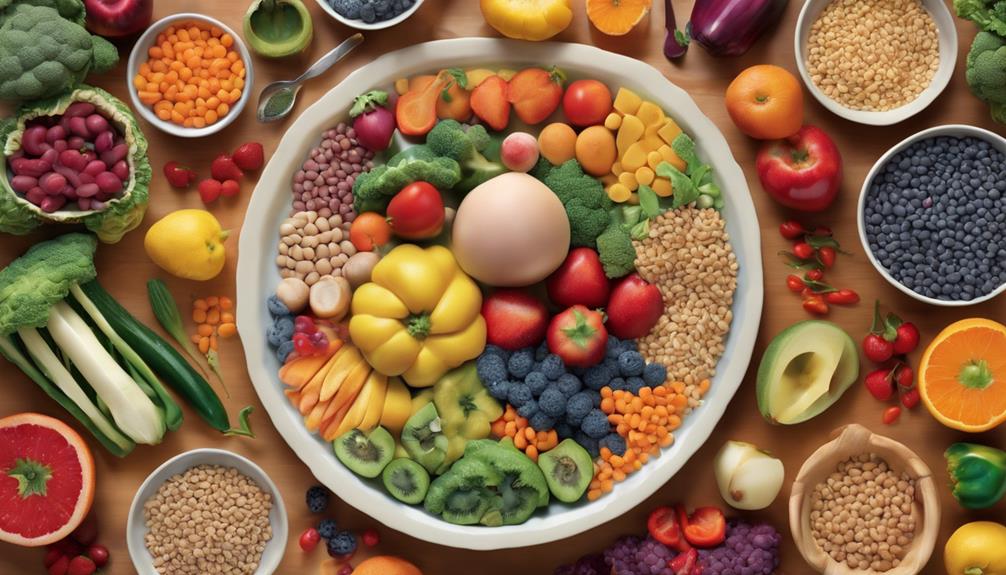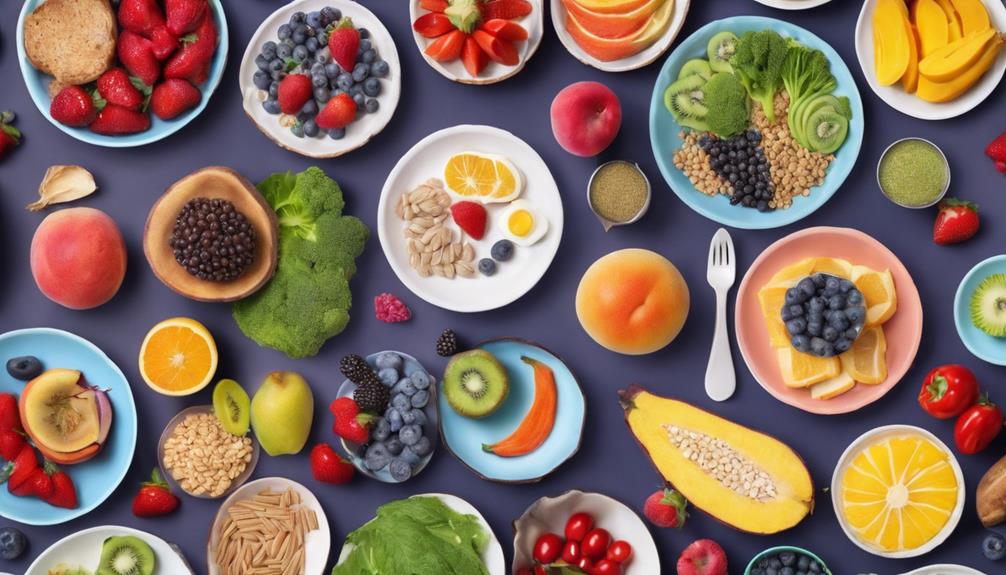When it comes to nourishing our little ones, we all want to make sure they're content and comfortable.
Imagine this: you're cuddling your baby, but the persistent gassiness is causing discomfort. Could your diet be a factor?
Join us as we explore the delicate balance of foods that can help ease your baby's gas issues.
Let's uncover the secrets to creating a breastfeeding diet that promotes a happy, less gassy baby.
Key Takeaways
- Incorporate probiotic-rich foods like yogurt for a healthy gut and less gas in your baby.
- Opt for easily digestible proteins such as chicken and fish to minimize gas issues.
- Maintain hydration with water-rich foods and 8-10 glasses daily for optimal breastfeeding.
- Monitor dairy intake to identify triggers for gas problems in your baby.
Foods That Reduce Baby's Gas
Moreover, incorporating probiotic-rich foods like yogurt into our breastfeeding diet can aid in reducing our baby's gas discomfort by fostering a healthy gut microbiome. When we consume foods that support a balanced gut flora, we're indirectly benefiting our breastfeeding baby by potentially decreasing excessive gas production.
Opting for easily digestible proteins such as chicken or fish can also play a significant role in minimizing gas in breastfed babies. These protein sources are gentle on the digestive system, making it easier for our little ones to process nutrients from breast milk efficiently.
Moreover, including fiber-rich foods like oats and brown rice in our diet can regulate digestion for both mom and baby, potentially decreasing the occurrence of gas. Additionally, choosing low-gas vegetables like carrots and squash over high-gas options such as broccoli and cabbage can further help alleviate baby gas. By being mindful of our food choices, we can contribute to a more comfortable feeding experience for our breastfeeding baby.
Proper Hydration for Breastfeeding Moms

To maintain peak milk production and support our baby's nourishment, breastfeeding mothers should prioritize consuming 8-10 glasses of water daily for proper hydration. Adequate fluid intake is vital for breastfeeding moms as dehydration can lead to a decrease in milk supply. Including water-rich foods like fruits and vegetables in our diet can also help maintain hydration levels.
Since breast milk is mainly water, at about 88%, staying properly hydrated is essential for both milk volume and quality. Signs of dehydration in breastfeeding moms, such as dark urine, feeling thirsty, and reduced milk production, indicate the necessity of maintaining proper hydration levels.
Balancing Protein Intake for Baby's Comfort
Balancing your baby's comfort through a well-rounded protein intake is essential for supporting their growth and development during breastfeeding. Including protein-rich foods like meat, poultry, fish, eggs, dairy, beans, nuts, and seeds in your breastfeeding mother's diet can help maintain a balanced diet for your baby's comfort.
Consuming protein 2-3 times a day is vital for adequate milk production and promoting a healthy breastfeeding experience. Variety in protein sources can reduce the likelihood of gassiness in your baby.
Balancing protein intake with other essential nutrients can lead to a less gassy and more comfortable breastfeeding experience for your baby. If your baby experiences tummy troubles, consider consulting a lactation consultant to evaluate your diet. Remember that some babies might've sensitivities to certain proteins, so if you suspect a food allergy, an elimination diet might be necessary.
Be mindful of dairy products and other common allergens in your diet to alleviate potential discomfort for your baby.
Importance of Fiber in Breastfeeding Diet

Fiber plays a critical role in supporting digestion and preventing constipation for both breastfeeding mothers and their babies. Adequate fiber intake is essential for maintaining a healthy gut microbiome, which can positively impact the baby's digestive system. Incorporating fiber-rich foods like fruits, vegetables, whole grains, and legumes into a breastfeeding diet not only provides important nutrients for the mother but can also benefit the breastfed baby's digestive health.
High-fiber foods contribute to a feeling of fullness, aiding in postpartum weight management for mothers. It's important to consume a variety of fiber sources to make sure a well-rounded and nutritious breastfeeding diet. By focusing on fiber-rich foods, breastfeeding mothers can support their own digestive health while potentially reducing gas and digestive issues in their breastfed babies. Prioritizing fiber in the breastfeeding diet can lead to overall better health outcomes for both mother and baby.
Monitoring Dairy Consumption for Gas Relief
When considering the management of gas relief in breastfed babies, it's important to monitor dairy consumption for potential triggers. Dairy products like milk, cheese, and yogurt can often be the culprits behind gas issues in breastfed infants.
Here are some key points to bear in mind when monitoring dairy intake for gas relief:
- Dairy Allergies: Approximately 2-3% of breastfed babies may have true allergic reactions to dairy in the mother's diet, causing excessive gas.
- Symptoms to Watch for: Signs of dairy sensitivity in babies include colic, gas, fussiness, or changes in stool consistency.
- Elimination Approach: Eliminating dairy from the mother's diet has been shown to help alleviate gas symptoms in some breastfed babies.
- Consult Healthcare Provider: Before making significant dietary changes to address gas issues in breastfed infants, it's vital to consult a healthcare provider for proper guidance and monitoring.
Frequently Asked Questions
Is My Breastfed Baby Gassy Because of My Diet?
Yes, our breastfed baby may be gassy due to our diet. Some foods like dairy, broccoli, and garlic can cause gas in babies. Eliminating these foods or seeking guidance from a healthcare provider can help ease baby's discomfort.
How Can I Make My Breast Milk Less Gassy?
We can make breast milk less gassy by avoiding gas-inducing foods like broccoli, cabbage, and beans. Dairy, eggs, wheat, peanuts, soy, fish, and nuts can also cause gas in babies. Consulting a healthcare provider for guidance is important.
What Foods Cause Upset Stomach in Breastfed Babies?
We've learned that dairy, eggs, wheat, peanuts, soy, fish, nuts, and certain veggies like broccoli can upset a breastfed baby's stomach. Being mindful of these foods can help ease digestive issues and guarantee a happier baby.
Why Is My Breastfed Baby Struggling With Gas?
We found that breastfed babies may struggle with gas due to air swallowing or foods in the mother's diet passing into breast milk. Monitoring diet and consulting a healthcare provider can help manage and reduce gas in babies.
Conclusion
Just as a well-balanced diet is key to reducing gas in our babies, so too is finding harmony in our own lives. By nourishing ourselves with the right foods and staying hydrated, we can create a peaceful environment for our little ones to thrive.
Remember, just as we feed our babies with love and care, we must also care for ourselves with the same intention. Balancing our diet isn't just about food, but about finding balance in all aspects of our lives.
With a rich background in writing and a keen interest in child development, she specializes in creating insightful, compassionate content that speaks directly to parents’ concerns and aspirations. Margaret believes in the power of shared experiences to bring comfort and confidence to parents everywhere.










